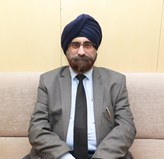The Secretary General of GI Council shares his views on issues facing non-life industry

Q.It has been three months since you took charge of the General Insurance Council as Secretary-General. What are your views on the challenges facing the non-life industry in India, and what is being done to address these issues? What, according to you, should be the council's priority?
Low insurance penetration and inadequate awareness, especially in rural areas and unorganized sectors, are the main challenges. The mission "Insurance for All by 2047" calls for not only awareness but availability and affordability also of insurance products to cover all citizens of India adequately. Leveraging the widespread use of mobile phones, awareness campaigns can promote policies to the masses. Member companies are developing long-term plans to extend insurance coverage to rural sections, including tailored products. With low-cost, easily understandable online and offline policies, insurance penetration is likely to increase. The council's priority is to enhance the credibility and trustworthiness of the non-life insurance industry through effective regulation, promoting best practices, and ensuring consumer protection. Furthermore, the council aims to foster innovation and digitalization to improve customer experience and drive industry growth.
Q.With you as the new Secretary-General and Mr. Tapan Singhel as Chairman of the council, the council is now seen as a strong voice for non-life insurance, and the level of activities has increased manifold. How do you envision the role of the council as an effective Self-Regulatory Organization (SRO) going forward, and what are the main challenges the council needs to address in the short term and long term?
The General Insurance Council plays a crucial role as an effective Self-Regulatory Organization (SRO) for the non-life insurance sector. Moving forward, we aim to strengthen this role by proactively engaging with stakeholders, advocating for industry interests, and addressing emerging challenges. In the short term, the council needs to focus on promoting insurance awareness, enhancing customer education, and streamlining claims settlement processes. In the long term, we must adapt to evolving market dynamics, leverage technology for efficient operations, and promote sustainable growth
Q.What new projects are being undertaken by the council?
The General Insurance Council is actively involved in various new projects to enhance the non-life insurance industry in India. These initiatives include promoting digitalization, improving customer experience, strengthening risk management practices, and fostering industry collaboration. The council is also working on developing industry standards, guidelines, and codes of conduct for uniformity and consistency. Specifically, the council is engaged in projects such as bringing all hospitals into cashless stream and standardized rates, Collaboration with NHA for developing products for missing middle and senior citizens, Pan-India Awareness Campaign, Reinsurance accounting platform, Jan Suraksha Automation, and regulator-led initiatives like Bima Sugam, Bima Vahak, and Bima Vistar.
Q.The recent floods in northern India once again exposed the lack of coverage and vulnerability against natural calamities. What is the industry's view on promoting parametric insurance in light of natural calamities and the large protection gap in rural areas?
The industry views parametric insurance as a promising solution to address the protection gap in rural areas and mitigate the impact of natural calamities. Parametric insurance offers swift and transparent claim settlements based on predefined triggers, eliminating the need for complex assessments. The council supports the promotion of parametric insurance and encourages insurers to develop innovative products and solutions tailored to the specific needs of rural areas.
Q.As an industry representative body, what are the main asks from the regulator and the government to make non-life underwriting profitable?
The General Insurance Council, as an industry representative body, seeks support from the regulator and the government to enhance the profitability of non-life underwriting. Key requests include regulatory reforms that enable risk-based pricing, effective risk management frameworks, reduced compliance burdens, and a conducive business environment. Additionally, the council seeks collaboration with the government to address challenges related to fraud and claim settlement processes.
Q.Health and Motor insurance cover about 70% of the non-life market in India. Is the Indian market overly focused on bulk premiums from these two segments, potentially leading to less interest, a talent deficit, and indiscipline in underwriting other lines of business?
While Health and Motor insurance currently dominate the non-life insurance market in India due to their large customer base and mandatory nature, the industry recognizes the need for diversification. The council encourages insurers to explore and develop niche markets, innovative products, and underwriting expertise in other lines of business (LOBs) to ensure a balanced portfolio and sustainable industry growth.
Q.Shouldn’t the industry enforce line-of-business-wise profitability to ensure each segment stands on its own, and underwriting doesn't cross subsidize other lines of business?
Implementing line-of-business-wise profitability is a viable approach to ensure self-sufficiency within each segment and prevent cross-subsidization. This approach would enhance risk management practices, encourage profitability in each line of business, and provide a clearer assessment of insurers' financial strength in different segments.
Q.The council is a member of UNEP PSI (Principles for Sustainable Insurance), a financial initiative of the UN. What can the council do to promote sustainability in insurance among industry members?
As a member of UNEP PSI, the General Insurance Council actively promotes sustainability within the insurance industry. The council encourages its members to adopt sustainable practices, incorporate environmental, social, and governance (ESG) considerations into their operations, and support.
Q.Finally, with the intensive activities the council is involved in, does it leave any room for you to pursue your hobbies and other interests?
While the council's activities demand significant attention, I believe in maintaining a balance between professional responsibilities and personal interests. Finding time for hobbies and other pursuits is important for overall well-being and effectiveness in my role and so I take out time to pursue my interests.